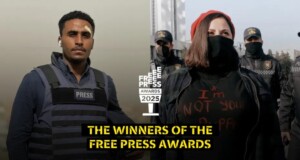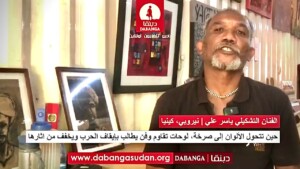Christians in Sudan can ‘still not believe the changes’
Sudanese Orthodox Christians celebrated Easter on Sunday, May 2. For the occasion, Radio Dabanga decided to investigate the experiences of Christians in Sudan before and after the ousting of former dictator Omar Al Bashir.
 Christians organising a mass near a demolished church in Bout, Blue Nile, December 2019 (social media)
Christians organising a mass near a demolished church in Bout, Blue Nile, December 2019 (social media)
Sudanese Orthodox Christians celebrated Easter on Sunday, May 2. For the occasion, Radio Dabanga decided to investigate the experiences of Christians in Sudan before and after the ousting of former dictator Omar Al Bashir.
Prime Minister Abdallah Hamdok congratulated Sudanese Christians on this ‘glorious Easter holiday’. The PM conveyed his Easter wishes to “the Sudanese church leadership and people inside and outside the country”.
“May God make all their days a feast, may they be happy, doing well, and enjoying stability”, Hamdok wrote on his official Facebook account.
The public celebration of Christian feasts has not always been supported by the country’s authorities. During the dictatorship of Omar Al Bashir (1989-2019), religious minorities were severely repressed in Sudan. Christian holidays were not recognised.
However, less than two weeks after the ousting of Al Bashir in April 2019, Sudan’s Transitional Military Council reinstated Sunday as the official recess day for Christian schools in the country. In December that year, the new government declared Christmas a public holiday for the first time in a decade.

For the occasion of this Easter holiday, Radio Dabanga reached out to several Christians in the country asking them if they experience any change following the revolution. However, many were not keen to answer questions in the media.
Jirjis Efendi*, a Nuba Christian basic school teacher from Omdurman, told Radio Dabanga that Sudanese Christians keep to themselves “because of the fear we had during the former regime".
“Christian people here are not used yet to freely expressing their opinion on religious subjects,” he said. “Most of us can still not believe that Sudan has changed.”
After Omar Al Bashir took power through a military coup in 1989, Sudan witnessed a significant clampdown on religious freedoms.
Especially from 2012 onwards, organisations such as Christian Solidarity Worldwide and the Sudanese Human Rights and Development Organisation (HUDO) reported an increase in detentions and deportations of Christians and in the “systematic targeting” of Christian minorities, such as Nuba Christians in South Kordofan.
Many priests and other Christians were detained by the infamous National Intelligence and Security Service (NISS).
At the end of 2012 and early 2013, the NISS in Khartoum expelled more than 240 foreign Christians from the country, accusing them of secretly evangelising Sudanese Muslims.
The government also prohibited the construction of churches and church buildings were frequently confiscated and demolished or burned.

After the fall of the Al Bashir regime, things have changed. In August 2019, the Transitional Military Council (TMC) and the Forces for Freedom and Change (FFC) signed a Constitutional Document that includes provisions regarding freedom of belief and worship.
After taking office, PM Hamdok promised that his administration would address “religious discrimination,” and the minister of religion invited Jews and Christians who had to leave to return to Sudan.
In his Easter message, Hamdok said that one of the main goals of the current transition process is that “the Sudanese, with their various religions, will be united”.
“Our aspiration is to achieve change and democratic transition after the painful years of tyranny, of setting groups against each other, and of the deliberate exclusion of some communities”, Hamdok wrote.
He invited Christians to “actively participate in the process of rebuilding and developing the homeland according to their wishes so that we can realise a new and different Sudan that accommodates all”.
Teacher Jirjis Efendi also spoke about a “great change”. Christians in post-revolution Sudan “are able to perform their religious prayers and organise their religious celebrations and events in public spaces with complete freedom, something new after 30 years of oppression, he told Radio Dabanga.
“The [Muslim] Minister of Religious Affairs even attends Christian celebrations and occasions, that are now recognised as official holidays,” he noted.
“Another positive development is the permission to construct new churches in a number of states, and Christian schools are allowed again to give lessons on Saturday instead of Sunday so that the teachers and pupils are able to attend the Sunday mass.
Yet, Efendi also said that there are still things to be done. Teachers specialised in Christian education are still not appointed in state schools. As for Christian educational textbooks, they are still printed by private printing houses and not by the Education Ministry – which prints all the other textbooks, including Muslim education and Islamic jurisprudence.
Furthermore, attacks on Christians or church buildings still took place after the ousting of Al Bashir. In March last year, two churches were burnt down in the space of three weeks whilst three churches were set on fire twice within four weeks in January that year according to the Sudanese Human Rights and Development Organisation (HUDO).
Lawyer Demas Marjan accused the Sudanese authorities of covering up on the burnings and practising a media blackout.
* Jirjis Efendi is a pseudonym.











 and then
and then